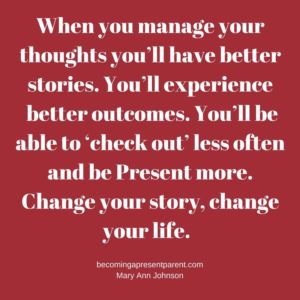 One evening, my husband Don was watching Sci-Fi on TV. I was cooking and could hear it. A man said to a woman, “To heal your wounds, you must see the past clearly.”
One evening, my husband Don was watching Sci-Fi on TV. I was cooking and could hear it. A man said to a woman, “To heal your wounds, you must see the past clearly.”
This woman had been mad at her mother her whole life. Her mother was killed in the jungle while trying to catch a spider known for its miraculous healing properties. Before dying, the mother delivered her child, who lived. The woman believed her mother went because of the wealth the spider would bring. She wondered why her mother had cared so little about her unborn child.
The man sent the woman into the past, to the jungle. She saw her mother’s excitement when they caught the spider. She saw her mother being attacked, then deliver her baby, and die. Those helping the mother used the spider venom on the baby’s tiny body. The woman had not known that her life was in danger, and her mother had gone into the jungle to save her.
When the woman returned to the present, she said to the man, “I didn’t know she was trying to save me. I didn’t have all the information and assumed she didn’t love me enough to keep herself out of harm’s way.” This woman physically returned to the past to get facts and clarity about something she didn’t understand, and it was life-changing.
I have heard all my life that you can’t change the past. You can’t go back. You have to let it go and move on. I no longer accept this counsel. I have experienced that we can change the past, at least in our minds, how it affects our present and future, and you don’t need to go there physically to do it.
The second perception experience was with my 50+ year old son, Seth. He has lived on Jodie’s property, where I live in our four-generation home, for over a year. It’s been nice to have his presence and help. We have all benefited, including Seth. His reason for coming here, from Montana, which he loves, was to take a series of classes to help him do some healing work. You see, no one’s past is trauma-free. It is the bag thing. : )
where I live in our four-generation home, for over a year. It’s been nice to have his presence and help. We have all benefited, including Seth. His reason for coming here, from Montana, which he loves, was to take a series of classes to help him do some healing work. You see, no one’s past is trauma-free. It is the bag thing. : )
After Seth finished his classes, he began working as staff/support for others on the same path. That fulfilling way to spend time is what has anchored him here. A few weeks ago, after working at a session, he had the opportunity to share an experience, to illustrate to those in the session that yes, you can change the past. The listeners were moved. Since then, he has been asked to share with others.
I asked Seth to write his experience so I could share it with you.
The Fundamentals of Changing Your Past by Seth Johnson
I am sure many of us, at different points in our lives, have said, “If I could just go back in the past and change that one thing, my life would be so different”. That sentiment is something I have said to myself hundreds of times.
Is it possible to change your past?
Yes, it is. You may be asking yourself, “How is that possible?” Well, it’s possible through rewriting the story and changing your perception of the memory you acquired through that experience. What does that mean?
What are the fundamentals of our past?
The fundamental aspect of our past is not the actual experience but the perception we create in our memory of that experience, which can either be good or bad in relation to how it affects our life. So, by rewriting our perception of the past, we then change our past.
A Real-life Example
“I spent 20 years hating my ex-wife. I told myself that she was a terrible person, that she destroyed my life, and the self-confidence I had, that I would never forgive her for stealing my dog, etc. etc. I have spent the last year and a half going through some personal development training and although what I am speaking of here was not necessarily one of the topics in class, I found this knowledge along the way.
The answer to changing my past was through rewriting the story, thus changing my perception of how I feel about her. I do not hate her anymore, and I never actually did. I truly love her and wish her the best in life. She did not destroy my self-confidence. I chose to be in a situation that created a beautiful learning experience. Not everything was bad; we shared beautiful times, and we loved each other in the way we knew how to love, which was distorted through early experiences in life regarding love. Neither of us knew how to show love healthily.
I chose to carry that hate and hurt for 20 years. It was never about the actual things she did along the way. I wasn’t perfect either and played a part in it all. It was the perceptions I placed into my memories regarding the so-called “bad things” she had done. The moment I re-wrote the story, it changed the perception of the story of my past, thus changing my past.”
Our Perception Does Matter
When something good or bad happens, we perceive others’ intentions and motives. Then we create our story around what we have chosen to believe. That isn’t always bad. But occasionally it’s helpful to rewrite a story and take a second look at an experience, if it is causing us pain, sorrow, grief, or another unhealthy response that negatively affects our life.
This is simple, but like many simple things, it isn’t easy. We can’t magically send ourselves back to an experience and watch it as if it were a movie where we are privy to what we didn’t know or understand. However, we can take our minds back. We can take a second look. We can give others the benefit of the doubt and think the best. We can choose to forgive even if the offender had bad motives or committed a terrible wrong.
And why would we do this instead of just holding the other person accountable? So we can free ourselves, to heal, to move forward, and have a better life
I know from my and Seth’s experience that when we understand the power our perception has, no matter our age, we can change the past, at least how it affects us going forward.





 I received a call from my sister, Rozanne. She was giving me an update on a difficult situation in her life. It was such a profound example of taking responsibility for your responses and choosing to let go of suffering, I asked her if I could share the experience with you.
I received a call from my sister, Rozanne. She was giving me an update on a difficult situation in her life. It was such a profound example of taking responsibility for your responses and choosing to let go of suffering, I asked her if I could share the experience with you.


 I had few boundaries! There were good reasons that I found myself in this place as a mother; sexual abuse, controlling adults, fear brought on by the cold war, and the upheaval of civil unrest, a belief that I shouldn’t have been born. Life and the future felt uncertain. I had no way to make sense of what was happening in my world and the larger world, no one to talk to about it, and it added to the fear I had held inside since I was a toddler.
I had few boundaries! There were good reasons that I found myself in this place as a mother; sexual abuse, controlling adults, fear brought on by the cold war, and the upheaval of civil unrest, a belief that I shouldn’t have been born. Life and the future felt uncertain. I had no way to make sense of what was happening in my world and the larger world, no one to talk to about it, and it added to the fear I had held inside since I was a toddler. A year ago, I met a relative I didn’t know existed. She is a painter, and I told her about my dream. She painted it for me, and it hangs on my office wall. Every day I repeat the above words out loud, and I look at my painting.
A year ago, I met a relative I didn’t know existed. She is a painter, and I told her about my dream. She painted it for me, and it hangs on my office wall. Every day I repeat the above words out loud, and I look at my painting. So let go of your worry. Do the best you can. Trust yourself and God that you can be whole. Trust your children that they will also do the work we all have to do. Then keep changing and growing. Healing and growing are each of
So let go of your worry. Do the best you can. Trust yourself and God that you can be whole. Trust your children that they will also do the work we all have to do. Then keep changing and growing. Healing and growing are each of 


 Recently I was taken back in time as I listened to a soundtrack by John Denver. He was a singer-songwriter from the1960s through the 1990s. I was a young teen when he began his career and I enjoyed his music.
Recently I was taken back in time as I listened to a soundtrack by John Denver. He was a singer-songwriter from the1960s through the 1990s. I was a young teen when he began his career and I enjoyed his music.

 A Very Bright Chicken!
A Very Bright Chicken! We have chickens, free-range chickens. That means they are never locked in the coop. That has its advantages and disadvantages!
We have chickens, free-range chickens. That means they are never locked in the coop. That has its advantages and disadvantages! she gets in I watched her. Within minutes I saw her scoot under the fence at the corner where it connects to our neighbor’s fence. I shooed her back out. Then I placed a large rock in front of the low spot.
she gets in I watched her. Within minutes I saw her scoot under the fence at the corner where it connects to our neighbor’s fence. I shooed her back out. Then I placed a large rock in front of the low spot. After I blocked her newest entrance I watched her pace from one end of the garden to the other looking for a way in. I could feel her frustration as she paced back and forth trying this and that.
After I blocked her newest entrance I watched her pace from one end of the garden to the other looking for a way in. I could feel her frustration as she paced back and forth trying this and that. she went back to pacing the fence line, then she veered to the left towards the pasture fence. The fence at the back of the garden is also the fence to the back pasture. It’s made of far different wire than our chicken wire garden fence.
she went back to pacing the fence line, then she veered to the left towards the pasture fence. The fence at the back of the garden is also the fence to the back pasture. It’s made of far different wire than our chicken wire garden fence.

 One morning a woman arose early and sat by her large front window and watched an incredible sunrise as it lit the valley in gold. She observed the shadow of the night moving out of the way of the suns rays as it rose slowly over the mountains. She could feel that it was going to be a beautiful day and it filled her heart with gladness.
One morning a woman arose early and sat by her large front window and watched an incredible sunrise as it lit the valley in gold. She observed the shadow of the night moving out of the way of the suns rays as it rose slowly over the mountains. She could feel that it was going to be a beautiful day and it filled her heart with gladness. things. At some point, I began to suspect that there might be a different way as I observed other families. But it came to a head for me when my neighbor walked across the street and handed me a brochure on anger management!
things. At some point, I began to suspect that there might be a different way as I observed other families. But it came to a head for me when my neighbor walked across the street and handed me a brochure on anger management!